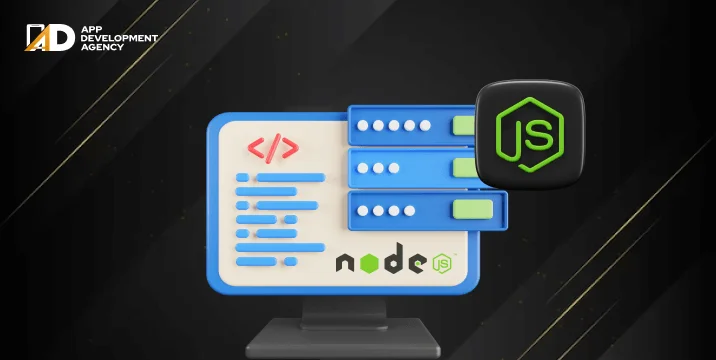Every developer steps ahead after having a decent understanding of JavaScript. Extending the same knowledge, the emergence of Node.js has enabled front-end coders (who used to make use of JavaScript only) to adopt back-end coding equally well. Full-stack developers have adopted Node.JS + MongoDB + Angular.JS or React well. Node.js is designed to be lightweight and provides only fundamental functionalities as a web server to boost web application development speed. This comes as an example of one of the dependable npm packages. Moreover, Node.js comes along with simple architecture and scalability, is an event-based and non-blocking driven server that is capable of handling a large number of real-time users.
Node.js is a fast and scalable option for medium sized to large network applications based on event-driven non-blocking input/output model that makes use of synchronous programming. It is a mobile and web application framework that is a combination of libraries, helpers and tools to provide a way to effortlessly build and run web and mobile applications. A web framework lays out the foundation for building apps or website with its architecture and features like flexibility, extensibility, security and compatibility with other libraries, etc. There is always some kind of generic implementation that is unique to the framework for every Node.js function which would then require the user to follow the lead of the framework by adding more codes to define its use cases.
Being at par with other JavaScript frameworks, web developer India prefers Node.JS frameworks due to their productivity, speed, and scalability. Besides this it provides a set of tools, guidelines and recommended practices that allow developers to write code for both front-end as well as the back-end, thus maintaining the coding pattern all through. In this way, this can eventually help strengthen the coding standards across the team of developers.
A framework can be difficult to select and subjective to its use-case. A developer normally selects based on the features that we like. Most of it often depends upon the weight of the framework of the application, simplicity, speed, learning curve, configuration, and flexibility. In other cases, GitHub stars can be useful for making a quick decision.
Top Node.JS frameworks in 2019 include Express.JS, Socket.io, Meteor.JS, Koa.JS, Sails.js, MEAN.io, Nest.JS, Loopback.io, Keystone.JS, Feathers.JS, Hapi.JS, Strapi.io, Restify.JS, and Adonis.JS; all these help boost productivity while building JavaScript application, especially on the server-side. Stars aren’t everything so we’ll be organizing by what we’ve seen to be popular on ADA blog:
It is fast, non-opinionative and minimalist web framework for node. It has 45,028 stars on GitHub (as of August 2019) and around 8MM npm weekly downloads. It behaves like a middleware to help manage servers and routes. Set of routing libraries, powerful collection of frameworks and focus on high performance, a multitude of easy to use HTTP utility methods, middleware and functions enable developers to easily write robust APIs.
const express = require(‘express’) const app = express() const port = 3000 app.get(‘/’, (req, res) => res.send(‘Hello World!’)) app.listen(port, () => console.log(`Example app listening on port ${port}!`))
Express has a thin layer of fundamental web application features (without neglecting Node.js) features. Some of the best practices for improving Express performance includes:
Koa can be called as an extension of Node.js, which aimed to replace Node.js. Built by the same team behind Express, is quite smaller, lightweight, much more expressive, has a robust foundation for web applications and API’s.
Koa leverages asynchronous functions, chucks callbacks and increases error-handling significantly. It does not chains or bundles any middleware routines within its core and provides an elegant suite of methods that smoothens writing servers. But it acts as an object containing an array of middleware functions which are composed and executed in a stack-like manner upon request.
const Koa = require(‘koa’); const app = new Koa(); app.use(async ctx => { ctx.body = ‘Hello World’; }); app.listen(3000);
Primarily, Koa.js allows programmers to get rid of callbacks. In case one wishes to be closer to the old programming style, Express.js turns out to be an option. But in other cases, Koa answers improved interoperability, robustness, helpful methods, lightweight code, error handling, generated based control flow, facilitating and upstream and downstream flow of control, cleaner and more readable async code.
Koa has much different design and is fundamentally a large departure from what Express.js is meant for.
Koa eases code management process, is lightweight, and makes use of asynchronous API’s in the code, keeping the code small, light, making use of GZip compression.
| Differences | Koa | Express |
| Middleware Kernel | The core Koa module is just the middleware kernel. | Express includes complete application framework featuring routines and templates. |
| Replace vs. Extend | Koa replaces context object ctx entirely. (ctx request and ctx response). | Express augments and extends native Node.js req and res objects. |
| Asynchronous/Await vs. Callback | Koa takes advantage of new async/await keywords. | Express is callback oriented. |
| Routing | No routing | Has routing |
| Convenience Facilities (sending files) | Not provided | Is provided |
| Templating | Not provided | Is provided |
| JSONP | Not provided | Is provided |
While Koa aims to fix and replace Node.js, Express aims to augment Node.js. Koa is designed to efficiently handle callbacks and handle the error. It brings out its ctx.request and ctx.response objects instead of Node’s req and res objects. Express brings up some additional features to enhance the features of Node.js and include features like routing and templating contradictory to Koa. Thus Koa can be seen as an abstraction of Node.js HTTP modules, while Express is an application framework for Node.js.
Top web development companies need to consider the following points before selecting a framework from Koa or Express:

Fun Fact – The median market valuation for a SaaS-based business is 15 times of its revenue. That is Huge! The number is astonishing and much more than other conventional business models. For instance, you own a SaaS business model and your annual revenue lies at $1 million today, then your current market valuation stands …
Continue reading “SaaS Business Model 2024: A Perfect Guide for Entrepreneurs”
Read More
“Do you know – Netflix & PayPal both of these giants switched to Node JS architecture and saw a significant improvement in the performance.” But what makes Nodejs frameworks stand out? Let’s find out!!! Nodejs frameworks are immensely popular open-source servers used for building high performance efficient applications. They are used to create online games …
Continue reading “13 Best Nodejs Frameworks in 2023”
Read More
Laravel is a PHP-based web framework that lines up web applications with critical language structures. It is used to create versatile backend layers based on RESTful APIs. It accumulates devices and application design. It performs in tandem with ASP.NET, MVC, CodeIgniter, Ruby etc. Laravel acts as a framework that organizes code sequence that makes it …
Continue reading “Emerging Laravel Framework: How Does It Instill Confidence In Web Apps?”
Read More